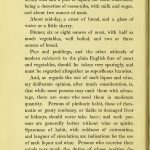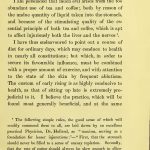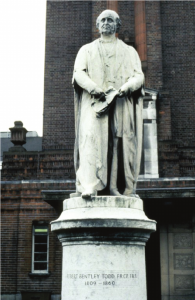~We’re delighted to offer this guest post! Lesa Scholl is Head of Kathleen Lumley College, the postgraduate college of the University of Adelaide.
I was extremely grateful to the amazing Hanna Clutterbuck-Cook recently when I sent out a desperate Friday afternoon email. This semester I’ve been visiting the Armstrong Browning Library at Baylor University, where they have a fantastic collection of nineteenth-century manuscripts and rare books. While I was examining Anglican pamphlets and tracts that engaged with poverty, hunger, and social justice, I happened upon a particular pamphlet: Remarks on Fasting, and on the Discipline of the Body: In a Letter to a Clergyman. By A Physician (1848). This pamphlet intrigued me, primarily because it was a medical doctor writing to a clergyman, not to speak against the practice of fasting, but to encourage appropriate ways in which to fast: ways that would promote bodily and spiritual health. He also gives a fascinatingly detailed description of what an appropriate diet ought to be—although he loses me when he tries to get me to refrain from coffee!


This pamphlet is central to my current book project, Fasting and Wasting: Religion, Nutrition, and Social Responsibility in Victorian Britain. I’m also looking at Robert Wilson Evans’s The Ministry of the Body (1847), which Remarks responds to directly. Evans’s work was published in the previous year, also by Rivingtons, who had published Remarks, and while my doctor-author begins by being extremely flattering in his citations of Evans’s work, he proceeded to critique every criticism on fasting that the clergyman had presented! An eminent medical doctor defending fasting to a clergyman—offering to teach the clergyman how to teach his flock to fast appropriately—isn’t exactly the expected trajectory.
I had found my clergyman, but my doctor continued to elude me. And that is where my MHL connection began—with the desperate Friday afternoon email! Hanna put me onto the Royal College of Surgeons, whose librarian got back to me within an hour. With true librarian magic, my doctor was uncovered, thanks to a nineteenth-century penciled annotation: another Robert. Robert Bentley Todd, MD, one of the founders of King’s College Hospital in London.

That Todd was the doctor is almost too good to be true. The question remains as to why such a prolific writer and influential figure chose to write the pamphlet anonymously. While I haven’t ascertained this answer fully, I suspect it was because it was well-known that Todd was good friends with John Henry Newman from his Oxford days, and it had only been three years since Newman’s extremely controversial conversion to Roman Catholicism. Given that Newman was also known for his more ascetic religious practices, including extreme fasting, and Todd’s own High Church persuasion, having the pamphlet signed may have influenced the readership to smell the dangers of popery. In fact, Todd was known to be deeply critical of extreme fasting, and, as his pamphlet details, held to fasting as food restriction more than complete abstinence—a stance that resonated with Todd’s and Newman’s fellow Oxfordian, Edward Bouverie Pusey’s attitude toward fasting in Tracts for the Times. Indeed, the reduction of portions rather than complete abstinence was seen as a way to prevent gluttony and intemperance at the end of the fast, and was believed to be more difficult than abstinence.
With my two Roberts—Evans and Todd—at the helm, my research has stretched out into the conversations that were occurring between medical doctors and theologians within nineteenth-century Britain, and the way in which these conversations impacted understandings of social responsibility and public health, as well as spiritual and moral wellness. I’m juxtaposing lesser known works in Victorian Studies, such as the multivolume Bridgewater Treatises and the Rivington Theological Library, with the more familiar Tracts for the Times, revealing the deep connections of thought and ethos between medicine and religion in the Victorian period.
The majority of my research engages with the way in which nineteenth-century doctors and theologians were thinking about the relationship between the body and the soul, and the way that then relates to the social body: how does our impetus to care for our physical bodies affect the way we think about the bodies around us? Many thinkers, both scientific and religious, saw a place for fasting that was both spiritually edifying, but focused outward toward the community: fasting to sympathize and understand; fasting to curb luxury and self-indulgence in an age of excessive consumerism when so many were starving; and, perhaps most importantly, in the words of Pusey, “to give to the widow, or the poor, the amount of that which thou wouldest have expended upon thyself.”





